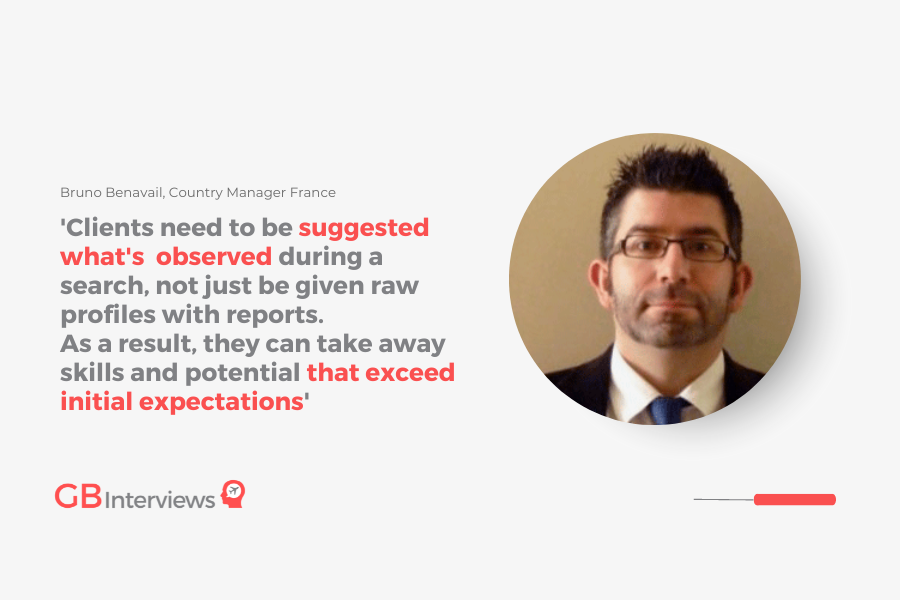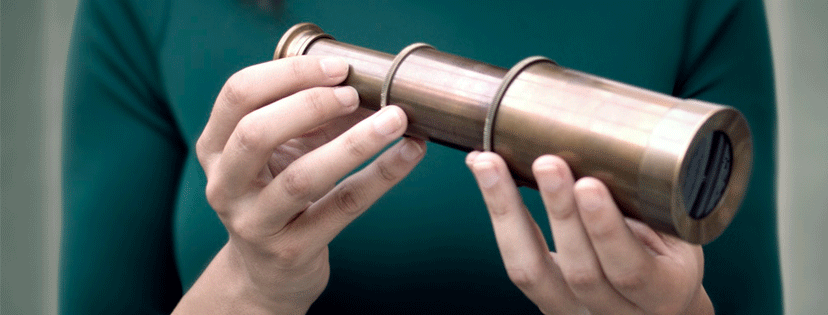Multi-purpose: that can do many things. That’s our partner Bruno J. Bénavail, GB Country Manager France. We started our relationship with him back in 2015, almost at the beginning of our journey. Since then he has been our France specialist. You can get an idea of how much he brings to the table by how long he’s been with us.
Like us, Bruno has never stopped learning and evolving, going from being an expert in recruitment to participating in consulting projects: performance strategies, succession planning, coaching… His training in neuroscience marks his way of working and makes having him on our team a success.
Your career as a human resources professional is extensive, and so is your expertise. We would like to know the types of projects in which you work, can you give us an overview of all your facets?
I have been working in recruiting for 11 years in many sectors. Clients usually come to me with complicated profiles that require a lot of research.
Every analysis starts from zero, considering how
I’ll be able to offer the best service to the customer.
I have to admit that after 11 years and several dozen processes, I’ve only had difficulties twice.
I have also prepared succession plans looking for the right profiles to keep the activity alive. By doing so well in advance, even small companies in difficult areas for the search have been successful.
On top of that, I am certified since 2015 by DISC, a cognitive-behavioural approach through which I am able to detect the potential of each individual and their inner characteristics. Talking for 15-30 minutes allows me to discover their personality, whether they could fit well with what they’ll have to do for the client, and how they’ll interact with their future hierarchy. This is complemented by the skills I have developed for transparent interview responses.
Within the variety of projects you have told us about, in which sectors have you gained experience throughout your career?
That’s a long question, I could say that I have participated in processes in all sectors. The projects allow me to learn more about each area even if I have already worked in them. It’s like nature, you can go through the same path 10 times, but if you know how to look carefully, you will never see the same things…
This is a summary of the sectors I have worked in:
- Aerospace, defense and security.
- Automotive industry.
- Construction.
- Consultancy and advisory.
- Food industry.
- Industrial transformation industry.
- Hotel and leisure industry.
- Life sciences: pharmaceutical, veterinary and biotechnology.
- Luxury and retail: watches, fragrances, jewellery, gastronomy and brands related to alcohol.
- Multimodal transport and international trade.
- Packaging industry, raw materials, plastics, glass and cardboard.
- Purchasing and logistics.
Your career as a coach is extensive, can you detail what you specialise in?
Coaching is a very broad field and can deal with almost all issues in life. As for my specialities, there are several. On the one hand, I work on helping to reduce limiting beliefs. I also create motivation in people, promoting positivity. In addition, I increase confidence in employees and executives to handle relevant issues.
Another field in which I work is to broaden the vision of individuals when faced with certain situations, and also to decrease negativity in the face of problems.
On the other hand, I offer my services to people who need to organise their agendas in order not to always feel behind, or not having time to do their tasks.
Which coaching projects make you feel truly relevant to the other person? Why?
All of them, from the point of view that a solution can be found for every problem.
During a coaching session at distance or in nature, with a person or a group, you feel that there comes a moment where something opens up. They “click” in their mind, they become aware of the problem and you can perceive it in what they say.

You also support people in their day-to-day work, what do these projects involve?
I usually deal with issues of reorganising the way people work. In these I often face challenges such as dealing with difficult people who put pressure on a team, or with whom employees are not comfortable.
Succession planning is complex and highly personalised. What tends to happen in family businesses and how do other types of organisations have to deal with these changes?
Most of the problems in this type of context are related to the personality, the values of the people involved and the difficulty they have had in transmitting the involvement demonstrated throughout their lives.
Within a family business, another very important point is the trust of outsiders. Coming from the outside, how can you convey a story while ensuring that the DNA of the company is not damaged?
You are trained in neuroscience, how do you use it to solve our clients’ most common problems?
Thanks to my knowledge I am able to identify what my clients need in the medium to long term. They often don’t.
Even during a short coaching session, I can see where the problem is and how it could be solved. But it is up to the person, to him or herself, to find the solution, not me. Otherwise I would be in the position of a “consultant”, not a coach.
On the other hand, to “business” clients you have to suggest what you observe during a search, not just deliver raw profiles with reports. Often there are beautiful findings and other types of information to be gained during a profile search, beyond pure research and interviews.
The added value of the research work is to bring to the client skills and potential that exceed initial expectations.
You work especially in French-speaking markets, but this does not only include France. What is your experience in North Africa, Belgium, Canada and the border with France?
Understanding 5 languages (Portuguese and Catalan) and speaking 3 others (French, English and Spanish), this goes beyond the French-speaking markets.
I have worked for companies located in the following markets: Canada, USA, Mexico, Argentina, Brazil, Norway, Russia, Switzerland, Germany, Hungary, Ukraine, Italy, UK, Spain, Morocco, Nigeria, Ivory Coast, Senegal, Tunisia, South Africa, Egypt, Turkey, Germany, South Korea, Thailand, Japan, India, Australia and New Zealand. The world’s mine and I like it! Hahaha.
In other words, if anyone needs support to develop their business globally, they can count on me!
In addition to providing services in France, you also work in Spanish-speaking and English-speaking contexts. Tell us how these diverse experiences enrich you.
I love the mix of views of workers in different countries. The different behaviours as well.
For example, the Spanish are much more positive and open-minded than the French, perhaps one reason why I’ve been working with you for almost 8 years now!
After the 2008 subprime crisis in Spain, which caused a certain social and economic collapse, you have redoubled your efforts to move forward. This is reflected in many aspects of life in Spain. People work hard and are happy to do so at almost any time (thinking of the tourism sector). I’s a great pleasure to travel or work in Spain, one of the countries that never sleeps ;-).
On the other hand, it’s visible how some countries are behind others in the area of international business. For example, the evolution of laws within a country that allow to realise the inequalities between women and men. Or the taking into account of nature in sustainability issues, where some countries (Northern Europe for example) are far ahead of others.
Have you carried out recruitment projects for Spanish companies looking for a French bilingual Spaniard?
Yes, these profiles can be difficult to find for two reasons. The first is that they come from regions that are not close to the French border such as the Basque Country, Aragon or Catalonia. Another reason is that they have not studied in France during their academic careers.
In countries with Latin culture such as Italy, Spain, Portugal or France, language proficiency is a big issue. With UK or US profiles it is different, they generally think that speaking English is enough… But the more languages you speak, the more doors open.
You started working as a Grupo Binternational specialist years ago, what do you value most in our collaboration?
What I value most is the human warmth and the positive people who work consistently. I’ve seen the development of the company from almost the beginning.
Since COVID-19 I see a new organisation. New developments have been put in place in marketing / communication / publications / professional and commercial networks.
Sometimes I wonder why I didn’t come directly to work with you hahaha.





